| Srl | Item |
| 1 |
ID:
148270
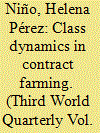

|
|
|
|
|
| Summary/Abstract |
This paper examines the class relations emerging in a contract farming scheme in Mozambique. Debates in the literature about contract farming characterise this market arrangement as leading to farmers losing control over production at the hands of capital. By discussing both the drivers and impacts of changes in the division of property and labour, this paper reveals a complex class structure in which the pressure of merchant capital on farmers is internalized within households and transferred onto workers and sharecroppers. This challenges the pertinence of conventional policy that prescribes empowering contract farmers without considering their varied class positions and interests.
|
|
|
|
|
|
|
|
|
|
|
|
|
|
|
|
| 2 |
ID:
148268
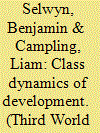

|
|
|
|
|
| Summary/Abstract |
This article argues that class relations are constitutive of development processes and central to understanding inequality within and between countries. Class is conceived as arising out of exploitative social relations of production, but is formulated through and expressed by multiple determinations. The article illustrates and explains the diversity of forms of class relations, and the ways in which they interplay with other social relations of dominance and subordination, such as gender and ethnicity. This is part of a wider project to revitalise class analysis in the study of development problems and experiences.
|
|
|
|
|
|
|
|
|
|
|
|
|
|
|
|
| 3 |
ID:
078929
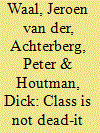

|
|
|
|
|
| Publication |
2007.
|
| Summary/Abstract |
By means of a reanalysis of the most relevant data source-the International Social Mobility and Politics File-this article criticizes the newly grown consensus in political sociology that class voting has declined since World War II. An increase in crosscutting cultural voting, rooted in educational differences rather than a decline in class voting, proves responsible for the decline of traditional class-party alignments. Moreover, income differences have not become less but more consequential for voting behavior during this period. It is concluded that the new consensus has been built on quicksand. Class is not dead-it has been buried alive under the increasing weight of cultural voting, systematically misinterpreted as a decline in class voting because of the widespread application of the so-called Alford index
|
|
|
|
|
|
|
|
|
|
|
|
|
|
|
|
| 4 |
ID:
153012
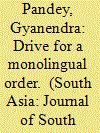

|
|
|
|
|
| Summary/Abstract |
This paper explores the changing contours of politics and democracy in our times by examining the ways in which populations and privileges are increasingly being distributed in cities and countries across the globe. In the light of these changing demographic and social conditions, it asks what are the appropriate terms for analysis of such population groups and their political aspirations, and suggests that we are working with outmoded analytical frames, concepts and languages that belong to another time. It goes on to a brief examination of the kinds of fault-lines that remain and that allow for a range of political initiatives and possibilities.
|
|
|
|
|
|
|
|
|
|
|
|
|
|
|
|
| 5 |
ID:
131991
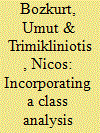

|
|
|
|
|
| Publication |
2014.
|
| Summary/Abstract |
This article has two main aims. First, it aims to challenge the widespread narrative in Cyprus studies that presents ethnic identities as historically inevitable and natural. Rather, identities need to be conceptualized as socially constructed. The second aim of this article is to problematize the argument that ethnic or national groups are homogenous actors. It underlines the need to deconstruct these supposedly unitary actors by making use of a class-based conceptualization of the state. By using such a conceptualization, the article will focus on the period between 1878 and 1974. It will start with a concrete analysis of the class structure in the Cypriot society and then will trace how different classes in both communities positioned themselves vis-à-vis political structures of power and how these positionings paved the way to the division of the island.
|
|
|
|
|
|
|
|
|
|
|
|
|
|
|
|
| 6 |
ID:
171940
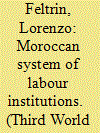

|
|
|
|
|
| Summary/Abstract |
The relevance of workers’ mobilisations in the 2011 Arab uprisings and – more recently – in the Algerian movement for democracy and social justice has encouraged a renewed interest in labour–state relations in the region. This article presents a class-based perspective on labour institutions, taking Morocco as a case study. In contrast to institution-based approaches, this research argues that it is problematic to treat the trade unions as analytical proxies for the working class, because this heuristic move conceals how class struggles – from below and from above – can transcend and transform labour institutions. The article proposes a framework to study labour–state relations, highlighting the relative autonomy of union officials from workers and vice versa. In this way, it shows how, in the neoliberal phase, the Moroccan state increased inducements to the unions while decreasing those to the workers and maintaining significant constraints on workplace organising. To use a simplified formulation, the regime included the unions to exclude the workers. In such a context of low union representativeness, the dangers of reducing the working class to the trade unions emerge clearly.
|
|
|
|
|
|
|
|
|
|
|
|
|
|
|
|